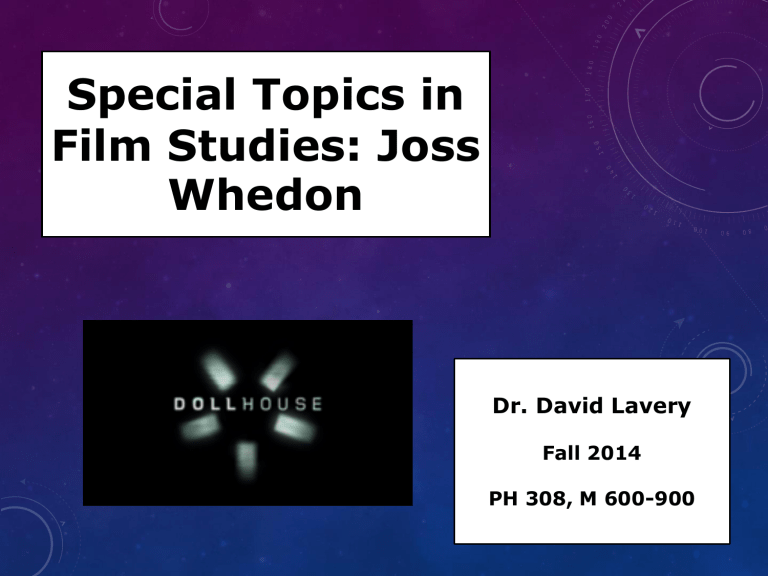Dollhouse - The Homepage of Dr. David Lavery

Special Topics in
Film Studies: Joss
Whedon
Dr. David Lavery
Fall 2014
PH 308, M 600-900
Special Topics in
Film Studies: Joss
Whedon
Special Topics in
Film Studies: Joss
Whedon
Special Topics in
Film Studies: Joss
Whedon
Special Topics in
Film Studies: Joss
Whedon
Special Topics in
Film Studies: Joss
Whedon
Dollhouse Studies
Special Topics in
Film Studies: Joss
Whedon
Dollhouse
Glossary
Special Topics in
Film Studies: Joss
Whedon
Special Topics in Film
Studies: Joss Whedon
actives—Dolls currently assigned personalities and operating in the field, supervised by a Handler at all times. [Tom
Cruz]
Dollhouse Glossary
Special Topics in Film
Studies: Joss Whedon
actuals—Anyone who has not been imprinted or wiped. An individual under contract to the Dollhouse whose personality has been removed or "wiped" in order to allow them to be programmed or
"imprinted" with alternate personalities in order to complete engagements. [Sarah
Gray-Panesi]
Dollhouse Glossary
Attic, the—A kind of prison to which dolls, handlers, or employees of the Rossum Corporation deemed too dangerous or untrustworthy are sentenced after being stripped of their personalities and reduced to mindless shells. [Tom Cruz] If an
Active is "broken" or any other employee of the Dollhouse becomes problematic, they are wiped of any and all awareness and sent to the Attic. Originally believed to be a state of maddening "almost thought" used strictly as punishment, the
Attic is actually discovered to be Rossum's supercomputer.
Kept in a state of constant terror, Attic residents' brains become a worldwide neural network, which ensures maximum computing power. [Sarah Gray-Panesi]
Special Topics in Film
Studies: Joss Whedon
Dollhouse Glossary
butchers—Anyone imprinted with the desire to attack and kill anyone not imprinted with the desire to attack and kill. Butchers, for the most part, target
Actuals and Dumb-shows, not each other.
[Sarah Gray-Panesi]
Special Topics in Film
Studies: Joss Whedon
Dollhouse Glossary
chair—Initially, the only method in which an
Active can be imprinted with a new personality. [Sarah Gray-Panesi]
Special Topics in Film
Studies: Joss Whedon
Dollhouse Glossary
client—Anyone who requisitions an Active for an engagement.
[Sarah Gray-Panesi]
Special Topics in Film
Studies: Joss Whedon
Dollhouse Glossary
composite event—A situation in which an Active is imprinted with multiple personalities at one time and experiences them all together. Echo and Alpha are the only Actives ever to maintain cognitive ability after a composite event. [Sarah Gray-Panesi]
Special Topics in Film
Studies: Joss Whedon
Dollhouse Glossary
"Did I fall asleep?"—The customary response of an active after waking post-wipe.
Special Topics in Film
Studies: Joss Whedon
Dollhouse Glossary
dolls—Those in service to the Dollhouse when not actively imprinted with a personality or in the field (at which they become Actives).
When not imprinted, they typically behave like innocent children, exhibiting complete trust, obedience, serenity, and innocence, but with significantly lowered cognition and an inability to defend themselves. See also
Active / Doll, Dumb Show, Imprint. [Sarah
Gray-Panesi, Tom Cruz]
Special Topics in Film
Studies: Joss Whedon
Dollhouse Glossary
dumb show—Anyone who has been remotely wiped and exists in doll state. [Sarah Gray-Panesi]
Special Topics in Film
Studies: Joss Whedon
Dollhouse Glossary
engagement—A mission or assignment completed by an active. [Sarah Gray-
Panesi]
Special Topics in Film
Studies: Joss Whedon
Dollhouse Glossary
extraction—Forced removal of an
Active and/or handler from an engagement. [Sarah Gray-Panesi]
Special Topics in Film
Studies: Joss Whedon
Dollhouse Glossary
glitch/glitching—An Active's experience of memories from "actual" life or past engagements while in doll state or on another engagement. Also, experiencing an imprint personality in a manner other than anticipated by the programmer glitch. See also Off Program, Engagement, Doll State,
Active / Doll, Imprint, Actual. [Sarah Gray-
Panesi]
Special Topics in Film
Studies: Joss Whedon
Dollhouse Glossary
grouping—Survival pattern adopted by some Actives in doll state characterized by instinctive "herding" with other specific
Actives. [Sarah Gray-Panesi]
Special Topics in Film
Studies: Joss Whedon
Dollhouse Glossary
handler—A Dollhouse security agent assigned to protect one specific Active.
Actives and Handlers go through a process of bonding to ensure the Active trust his or her Handler completely. [Sarah Gray-
Panesi]
Special Topics in Film
Studies: Joss Whedon
Dollhouse Glossary
handler-active bond or imprint—
Procedure completed in the Chair that causes the Active to trust his/her handler "without question or hesitation." [Sarah Gray-Panesi]
Special Topics in Film
Studies: Joss Whedon
Dollhouse Glossary
houses—Individual secret locations around the world where
Actives are kept ready for engagements. [Sarah Gray-
Panesi]
Special Topics in Film
Studies: Joss Whedon
Dollhouse Glossary
imprint—Personalities developed by each House's programmer from scans of actual people then uploaded to the Active's brain via
The Chair. [Sarah Gray-Panesi]
Special Topics in Film
Studies: Joss Whedon
Dollhouse Glossary
neural apocalypse—The end of the world brought about in
“Epitaph 1” and “Epitaph 2” when wiping technology gets out of control.
Special Topics in Film
Studies: Joss Whedon
Dollhouse Glossary
Neuropolis—Once Tucson, AZ, this is the seat of Rossum's leader after the neural apocalypse. [Sarah Gray-
Panesi]
Special Topics in Film
Studies: Joss Whedon
Dollhouse Glossary
Rossum Corporation—The evil multi-national corporation that owns and operates multiple
Dollhouses worldwide.
Special Topics in Film
Studies: Joss Whedon
Dollhouse Glossary
Safe Haven—A stronghold set up by
Echo and other fugitive Actives and
Actuals after the neural apocalypse from they raid nearby Neuropolis for supplies and plot Rossum's destruction. [Sarah
Gray-Panesi]
Special Topics in Film
Studies: Joss Whedon
Dollhouse Glossary
scrubbing—Scrubbing, a more careful and thorough method of wiping, occurs if an Active has been glitching or if the
Dollhouse has experienced a security breach. [Sarah Gray-Panesi]
Special Topics in Film
Studies: Joss Whedon
Dollhouse Glossary
tech—Any electronic device that could possibly receive a signal from Rossum. [Sarah
Gray-Panesi]
Special Topics in Film
Studies: Joss Whedon
Dollhouse Glossary
treatment—Code word used during an engagement to coax an Active back to the Dollhouse ("Would you like a treatment?") or to coax an Active in doll state to the imprint room. Actives are programmed to enjoy their treatments and should cease whatever action they are engaged in to have one. See also
Houses / Dollhouse, Active / Doll, Imprint
Room. [Sarah Gray-Panesi]
Special Topics in Film
Studies: Joss Whedon
Dollhouse Glossary
wedge—External hard drives on which imprints and original personalities for Active's are stored. Each Active has his or her own set of wedges including their original personality and a back up.
[Sarah Gray-Panesi]
Special Topics in Film
Studies: Joss Whedon
Dollhouse Glossary
wipe—Removal of an Active's engagement personality. [Sarah
Gray-Panesi]
Special Topics in Film
Studies: Joss Whedon
Dollhouse Glossary
Special Topics in Film
Studies: Joss Whedon
Dollhouse:
The Major
Players
Special Topics in
Film Studies: Joss
Whedon
Dollhouse: The
Major Players
Special Topics in
Film Studies: Joss
Whedon
Dollhouse: The
Major Players
Special Topics in
Film Studies: Joss
Whedon
Dollhouse: The
Major Players
Special Topics in
Film Studies: Joss
Whedon
Dollhouse: The
Major Players
Special Topics in
Film Studies: Joss
Whedon
Dollhouse: The
Major Players
Special Topics in
Film Studies: Joss
Whedon
Dollhouse: The
Major Players
Special Topics in
Film Studies: Joss
Whedon
Dollhouse: The
Major Players
Special Topics in
Film Studies: Joss
Whedon
Dollhouse: The
Major Players
Special Topics in
Film Studies: Joss
Whedon
Dollhouse: The
Major Players
Special Topics in
Film Studies: Joss
Whedon
Dollhouse: The
Major Players
Special Topics in
Film Studies: Joss
Whedon
Dollhouse: The
Major Players
Dollhouse:
Episodes
Special Topics in Film
Studies: Joss Whedon
Special Topics in Film
Studies: Joss Whedon
Dollhouse: Episodes
1.1
Special Topics in Film
Studies: Joss Whedon
Dollhouse: Episodes
1.2
Special Topics in Film
Studies: Joss Whedon
Dollhouse: Episodes
1.3
Special Topics in Film
Studies: Joss Whedon
Dollhouse: Episodes
1.4
Special Topics in Film
Studies: Joss Whedon
Dollhouse: Episodes
1.5
Special Topics in Film
Studies: Joss Whedon
Dollhouse: Episodes
1.6
Special Topics in Film
Studies: Joss Whedon
Dollhouse: Episodes
1.7
Special Topics in Film
Studies: Joss Whedon
Dollhouse: Episodes
1.8
Special Topics in Film
Studies: Joss Whedon
Dollhouse: Episodes
1.9
Special Topics in Film
Studies: Joss Whedon Dollhouse: Episodes
1.10
Special Topics in Film
Studies: Joss Whedon
Dollhouse: Episodes
1.11
Special Topics in Film
Studies: Joss Whedon
Dollhouse: Episodes
1.13
Special Topics in Film
Studies: Joss Whedon
Dollhouse: Episodes
2.1
Special Topics in Film
Studies: Joss Whedon
Dollhouse: Episodes
2.2
Special Topics in Film
Studies: Joss Whedon
Dollhouse: Episodes
2.3
Special Topics in Film
Studies: Joss Whedon
Dollhouse: Episodes
2.4
Special Topics in Film
Studies: Joss Whedon
Dollhouse: Episodes
2.5
Special Topics in Film
Studies: Joss Whedon
Dollhouse: Episodes
2.6
Special Topics in Film
Studies: Joss Whedon
Dollhouse: Episodes
2.7
Special Topics in Film
Studies: Joss Whedon
Dollhouse: Episodes
2.8
Special Topics in Film
Studies: Joss Whedon
Dollhouse: Episodes
2.9
Special Topics in Film
Studies: Joss Whedon
Dollhouse: Episodes
2.10
Special Topics in Film
Studies: Joss Whedon
Dollhouse: Episodes
2.11
Special Topics in Film
Studies: Joss Whedon
Dollhouse: Episodes
2.12
Special Topics in Film
Studies: Joss Whedon
Dollhouse: Episodes
2.13
For as much blame as Fox warrants for Dollhouse ’s rough takeoff —the scrapped pilot, the uncertain early episodes, the
Friday death slot —the network deserves credit for producing a show this ambitious and allowing it to air all but one episode for two seasons, despite deadly ratings. This wasn’t a Firefly situation, where Whedon needed a movie to tie up loose ends.
This was a complete series, and we should be grateful for what we got.
—Scott Tobias, Onion TV Club
Special Topics in Film
Studies: Joss Whedon
At a Paley Center “Inside Media” evening (4/15/2009) devoted to
Joss Whedon’s “brilliant but cancelled” fourth television series
Dollhouse (Fox, 2008-2009) the show’s creator—tongue characteristically, firmly planted in cheek —wonders out loud about the origins of his diegetic surrogate Topher Brink, the geeky scientist who programs the
Actives:
Special Topics in Film
Studies: Joss Whedon
That Topher —what’s wrong with him? He just creates these character people and then he just puppets them around, and he thinks it’s OK to do that. Who’s he based on? What monster?
Neither Whedon nor his cast and crew knew then that Dollhouse would, to pretty much everyone’s surprise, be renewed a month later.
(Whedon would later characterize the extension as a mistake: “Fox forgot to cancel my show. . . . Very awkward. They looked and said,
'Oh, this is our bad. We forgot to cancel your show. You're going to have to make more'” [“Whedon on Horrible Nomination”].)
In the series finale (1/29/2010), however, the jury was still out on the driven-nearly-mad-by-guilt, neural-apocalypse-causing Topher, as the following exchange makes apparent:
Special Topics in Film
Studies: Joss Whedon
Paul Ballard : The point is Topher thinks he can flip it. Create a pulse to restore all the wiped minds.
Zone : Yeah? He also thinks he's a little teapot short and stout.
Adelle DeWitt : Topher Brink is a genius! And you will keep a civil tongue in this house or we'll put your tongue in a stew. (“Epitaph
Two: Return,” 2.13)
Shakespeare, John Keats once insisted in an 1819 letter, “led a life of allegory: his works are the comments on it.” Whether we understand
Joss Whedon —who would turn to adaptation of the bard’s Much Ado
About Nothing for relaxation after wrapping The Avengers —as an allegorical monster or genius, Dollhouse is not likely to make or break his reputation.
In 2005, Whedon would ruminate darkly on his experience with television:
Special Topics in Film
Studies: Joss Whedon
You know, when I was at the height of my success, I was squashed like a cockroach by the very company who had benefited the most from that success. . . . The fact of the matter is, there is no track record in TV. Nobody cares about a track record. With the exception of about one or two guys, you just can't get something on because you're you. And in some ways that's good, because you should always have to fight for something; that's how you find out that you believe in it. But in some ways it's bad, because you can be squashed like a bug when you're actually doing it right. So it's not so much that I got over TV as I began to feel the TV landscape had gotten over me.
And maybe that'll change. (Matheson)
Whedon’s decision to do Dollhouse should not be read as an indication that the climate of television had necessarily changed. The
Aristotelian “material cause” of Dollhouse was practically Whedon’s
Special Topics in Film
Studies: Joss Whedon
long-term development deal with the bug-squasher itself, Fox. Before
Dollhouse had aired, Entertainment
Weekly’s Jeff Jensen had noted that
Fox had gone out of its way to acknowledge its previous rocky relationship with Whedon and support his new venture.
Whedon’s possible misgivings about his new project were nevertheless apparent in the aired Dollhouse pilot’s opening scene in this exchange between Adelle DeWitt (Olivia
Williams), the Dollhouse’s boss, and potential recruit Echo (Eliza Dushku):
Special Topics in Film
Studies: Joss Whedon
DeWitt: We can offer you a clean slate.
Echo: Did you ever try to clean an actual slate? You always see what was on it before. ("Ghost," 1.1)
Special Topics in Film
Studies: Joss Whedon
Writing in Salon , Heather Havrilesky had already noted the possible metacommentary on Whedon's pact with the devil Fox implicit in the metaphor: that the new show’s relative lack of Whedonian signatures might well be the result of the network’s scrubbing of its creator’s customary cult-engendering eccentricity.
With an origin myth that includes a sit-down at lunch with career-inthe-doldrums Dushku ( Buffy ’s bad girl slayer Faith), desperate for a project, Dollhouse was never pure Whedon from the outset. The idea he came up with (according to some versions during a visit to the men’s room) was a science fictioner set in a (literally) underground
Los Angeles company, a dvision of the ultra-sinister Rossum
Corporation, offering forhire for very large fees “secret agents,” dolls, both male and female, able to take on almost any role or task after being reprogrammed by futuristic neurological technology. Originally intended to be a network friendly, relatively free from seriality, episodic series (Where have we heard this before?), Dollhouse was to give us Dushku (Echo) performing a different Active each week, thereby showcasing her acting talents.
Special Topics in Film
Studies: Joss Whedon
From the beginning, however, Dollhouse was a troubled show. Its “rough takeoff—the scrapped pilot, the uncertain early episodes, the Friday death slot”—singled out by Tobias (see the epigraph above) was a disconcerting development but basically déja vu all over again: had not Firefly faced the very same obstacles? More significantly, complaints, troubling in regard to a show from “Joss
Whedon : Feminist,” were heard from the beginning about the show’s questionable messages: were not the dolls being sold into sexual slavery in some episodes?, critics understandably asked. In Wired, Adam Rogers would memorably characterize Dollhouse as
“an icky Fantasy Island with gunfights
Special Topics in Film
Studies: Joss Whedon
and psychosis” (174).* Many found fault as well with Dushku’s acting, and some of the stand-alone stories were lame to say the least. But the remainder of the ensemble cast was uniformly excellent, especially
Williams as Adelle DeWitt; Harry Lennix as Boyd Langston, Echo’s
“handler” (and eventually much more); Enver Gjokaj and Dichen
Lachman as prominent dolls Victor and Sierra; and Fran Kranz as Topher.
_______
*Rogers offers a memorable depiction of
Whedon’s
Dollhouse defensiveness during a sitdown:
You know you’ve offended Joss Whedon when he stops talking in Whedonisms. Usually the writer-director is funny, wry, and acutely self-aware
—just like the characters he creates for his shows and movies. . . . He’ll order a chardonnay at lunch and slouch sideways in a booth, riffing on geek tropes from Star Trek to Twilight Zone .
But suggest that his TV show Dollhouse was really just about a pretty girl in a dominatrix outfit getting beaten up every week and Whedon transfigures into Buffy’s erudite, everso-slightly supercilious mentor, Giles
—if you could imagine Giles in a hoodie. The words get longer, the references more arcane. He sits up and leans over his plate of scallops, elbows on the table. The professor has arrived, and class is in session. (174)
Special Topics in Film
Studies: Joss Whedon
Being a Whedon show, Dollhouse became, of course, much more than merely episodic. Echo faced her weekly challenges —as, to name only a few, a crisis negotiator (“Ghost”), back-up singer/bodyguard (“Stage Fright,” 1.3), burglar (“Gray Hour,” 1.4), blind cult member (“True Believer,” 1.5), a dead woman (“Haunted,”
1.10), an F.B.I. agent (“Vows,” 2.1), a mom (“Instinct,” 2.2), a college student (“Belle Chose,” 2.3). But in multi-episode story arcs we also followed investigation of the Dollhouse’s improbable existence by rogue F.B.I. agent Ballard (Tahmoh Penikett); met the mysterious psychopath Alpha (Alan Tudyk ) (“Omega,” 1.12; “A Love Supreme,”
2.8); learned about the backstories of Echo/Carolyn, Victor, and
Sierra (“Needs,” 1.8; “Belonging,” 2.4; “Stop-Loss,” 2.9); tracked the crusade of Senator Daniel Perrin (Alexis Denisoff) to expose the
Dollhouse (“The Public Eye,” 2.5; “The Left Hand,” 2.6); ascended to the mysterious and frightening “Attic,” a nether world for failed Dolls and Rossum Corporation enemies (“The Attic,” 2.10); and visited other Dollhouses and discovered Rossum’s insidious schemes and ambitions (“Echoes,” 1.7, “Getting Closer,” 2.11; “The Hollow Men,”
2.12).
Special Topics in Film
Studies: Joss Whedon
By his own admission (in the
Paley Center discussion and elsewhere), Whedon had put two women in charge, Angel veterans
Sarah Fain and Mere Smith, in order to help deflect criticism, and, when they left the series after Season One, replaced them with another pair of female showrunners: Michele Faszekas and Tara Butters (creators of the cancelled CW show Reaper
[2007-2009]) . Whedon’s own credited involvement, however, was minimal.
Special Topics in Film
Studies: Joss Whedon
One of the greatest, most innovative writers/directors in the history of the medium, he would write and direct only two episodes —“Ghost” and “Vows”
(2.1), the initial outings of both seasons —and write the very meta
“Man on the Street” (1.6), perhaps the best aired episode of Season 1.
Purported prior to airing to be a
Dollhouse "game-changer," it was the first in which Whedonian wit was prominently featured (my favorite: Patton Oswalt's Bill
Gatesey character talking about a judge who will "throw the Kindle" at
Paul Ballard for his intrusion). On
Entertainment Weekly online, Ken
Tucker would cogently observe:
Special Topics in Film
Studies: Joss Whedon
So it turns out, Joss Whedon is operating at a different speed than most current makers and consumers of TV. At a time when everyone wants to make snap judgments of new shows, and when television content creators feel pressure to make their concepts immediately understandable
/ irresistible, Whedon chose to lull us into thinking Dollhouse was going to remain a series about Eliza Dushku looking as though someone had hit her over the head with a shovel every week whenever she wasn't dolled up like a boy-toy having ferocious sex with a "client."
Special Topics in Film
Studies: Joss Whedon
Whedon had done this before, of course. Season Five of Buffy had many perturbed by the introduction of a little sister for the Slayer, but then, after getting her ass kicked by Glory, we learned, in "No Place
Like Home" (5.5), as we were told by a monk dying in Buffy's arms, that Dawn was the Key, and we gasped.
Special Topics in Film
Studies: Joss Whedon
Whedon would also supply the story for and direct the unaired, available for the first time on DVD, “Epitaph One.” Overseas distribution of Dollhouse had required thirteen episodes, but Whedon and company had only contracted for twelve. So on the fly they gave us —for lagniappe —a dark tale set in an apocalyptic future, a nightmare world in which the Dollhouse’s wiping technology has gone global, basically zombifying the human race. Shot on a Fox-placating shoestring budget, it stands as a splendid example of television’s astonishing ability to do more with less, to transform necessity into genius. “Epitaph Two:
Return” (2.13), the series’ satisfying finale, would, of course, return to
Dollhouse ’s future tense.
Special Topics in Film
Studies: Joss Whedon
Whedon’s interviews and DVD commentaries have always been self-deprecating, but his work on
Dollhouse took his disparagement to new levels. The opening sequence of “Ghost,” which gives us a motorcycle chase scene
(actually shot, Whedon acknowledges, by David Solomon) and Dushku dancing wildly in a skimpy dress, leads the director to observe: “I’m like Michael Bay but not so good at shooting,” and a subsequent scene showing us the
Dollhouse’s co-ed shower finds him commenting sarcastically “I’m some kind of genius man.”
Special Topics in Film
Studies: Joss Whedon
If Dollhouse seemed to transpire a bit outside the known
Whedonverses, it is possible with 20/20 hindsight to see it nevertheless as the beginning of a trend. In his dialogue with Drew
Goddard in The Cabin in the Woods: The Official Visual Companion
Whedon admits to an end-of-the-decade new favorite theme:
I think for me, ultimately, so much of our behavior is socialized and programmed and so much of it is self-destructive and useless and cruel, and so much of our society is more and more in the hands of a few very rich, very corrupt people, or very wellmeaning people who have no business controlling the lives of others. It doesn't matter if they're corrupt or well-intentioned —the point is, we are all controlled, we are all experimented upon, and we are all dying from it. . . . So the person is who experimented upon is me, it's everyone, and it's constant. So I guess it's a bit of an obsession. (19)
Special Topics in Film
Studies: Joss Whedon
This obsession, so apparent in The Cabin in the Woods , first surfaced in Firefly (e.g., the machinations of The Alliance).
Dollhouse —a series produced contemporaneously with Cabin’s conception and filming —explored it to the fullest.
What was Dollhouse ? As unsatisfying as it sometimes was to even ardent Whedon proponents like the present author, it’s hard to disagree with Tobias’s assessment (in the epigraph) that even Fox
“deserves credit for producing a show this ambitious and allowing it to air all but one episode for two seasons, despite deadly ratings,” and, unlike Firefly, it had its chance. But then again, it could have been so much more. In The “Defining Moments” featurette on the Season 2
DVDs, Whedon acknowledges that he had originally pitched at least six seasons of Dollhouse stories to Fox .
Special Topics in Film
Studies: Joss Whedon
Watching it again, beginning-to-end, over a few days time, I found it substantially more satisfying than I had when parsed out over a couple dozen Fridays, almost ready to agree with Noel Murray’s assessment of Dollhouse ’s whole arc: “It’s as though
MacGyver gradually morphed into Battlestar
Galactica .” I am going to tuck it away—perhaps in
“my drawer of inappropriate starches”—and watch it yet again one day soon.
Special Topics in Film
Studies: Joss Whedon







